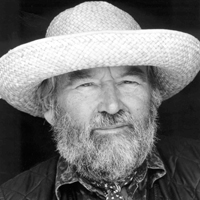The French Lieutenant's Woman as a Historical Novel
John Fowles's The French Lieutenant's woman is a historical novel. It represents lots of brands of Victorian realities, which are historically important. It represents a Dorset farm girl's revolt against Victorian convention. Sarah Woodruff revolted against the Victorian notion of womanhood. She put on the role of a social outcast. To revolt against the Victorian notion of womanhood, Sarah Woodruff played the part of being the French lieutenant's whore.

John Fowles (1926-2005)
By assuming the role of a whore and an outcast Sarah transcended the Victorian conventions. She became an independent woman whose womanhood was unconstrained by barriers of Victorian norms and values. She presented herself as that sort of girl who put a premium on freedom rather than marriage. Sarah is a symbol of a postmodern woman's revolting audacity. Her courage of revolt made a mockery of Victorian conventions. Sarah's revolting life is historically important because the history of Victorianism had real evidences to prove that an individual's sense of revolt against Victorian conventions had been increasing. Sarah not only launched a revolt against the Victorian notion of womanhood, to our utter surprise, she also came to that womanhood among the Pre-Raphaelites in London after throwing into exile the comfortable life of an intelligent young gentleman from the upper class.
In addition, in The French Lieutenant's Woman, John Fowles has represented how a city valet and a provincial housemaid succeeded in marriage and mercantilism. Sam and Mary happened to get into marriage. The lower working class Sam and Mary's success in marriage and mercantilism throws a spotlight upon a brand of historical reality regarding to the gradual upper surge in the progressive movement of a lower working class. In this regards it sounds relevant to say that John Fowles's The French Lieutenant's Woman is a historical novel.
It is a historical novel because it is the story of a kind old spinster aunt, a frivolous London girl whose wealth has barely failed to spoil her. The novel's panorama of Victorian England bears close-up of such specialized activities as London whoring and legal negotiating. The book documents the discussions of Victorian science, politics, economics, and social custom. It describes both urban and pastoral England. Such illumination is expected of a historical novel.
In the epigraph on the head of each chapter John Fowles mentions different voices from different writers in the Victorian era. Arnold is cited in the epigraph, Marx is cited, Hardy is cited, and Darwin is cited. These citations in epigraphs are suggestive of different Victorian contradictory voices, which are historically important.
Charles Smithson's fear that Sarah Woodruff may get ruined in London brothel houses suggest subtly the historical reality regarding the Victorian perversion in sexuality. Charles and Sarah used to meet- secretly in Lyme Regis whereas Charles' Valet Sam and Mary were relatively and comparatively free to consummate their love. From these events we come to know that upper-class people were, during the Victorian era, under moral pressure to make love. They were not openly free to make their love. On the contrary the lower-working class people like Sam and Mary were comparatively freer than upper class in their romantic pursuit. From this example also we can catch a glimpse of historical reality as reflected in The French Lieutenant's Woman.
If we examine the nature of relationship between Ernestina and Charles, We can acquire a good deal of historical facts. Mr. Freeman is Ernestina's father. He rose from the lower classes to making himself into a successful merchant. "Through his devotion to business and trade, he has become a prominent member of the upper class society. He is proud of his position, but is very superficial at the same time. His daughter's engagement to Charles is merely a business contract to him. He sees it as a useful barter system where both parties profit from the union. Charles gets Ernestina's money is exchanged for a title, Money and social prominence mean a great deal to Mr. Freeman. Mr. Freeman despises Charles, who he believes is lazy. He is deliberately being insulting when he offers Charles the position of an executive in his business. He is quite aware that Charles would rather be dead than be caught working in a trade. The upper titled classes rarely mingled with the trade and commerce classes.
From this we come to know a historically significant social reality. The upper titled classes were living a lazy life. They were away from the business and trade. But they used to marry a middle class girl if she has lots of money. Even the middle class family was crazy for the title of the upper class. The reality of the constant expansion in Victorian classes is one brand of historically significant social reality.
Another brand of social reality is that Sarah Woodruff has taken shelter in the Rossetti's painting Hall. The Rossetti's had shaken the conventional foundations of English society with their unconventional works. They paved the way for a new breed of writers and artists, who changed the cultural scene of England with their revolutionary works. Thus, it seems every part of the action in The French Lieutenant's woman is illuminated with historical reality. All these already presented evidences enable us to claim that The French Lieutenant's woman is a historical novel.
Literary Spotlight
Summary of The French Lieutenant's Woman
Introduction of The French Lieutenant's Woman
Narrative Technique in The French Lieutenant's Woman
The French Lieutenant's Woman as a Postmodern Novel
The French Lieutenant's Woman as a Metafiction
Exploration of Selfhood in French Lieutenant's Woman
Biography of John Robert Fowles
 |
bachelorandmaster.com |